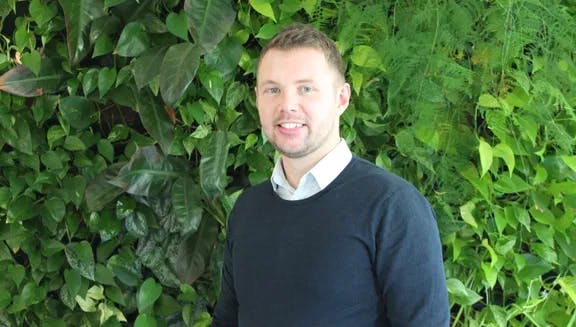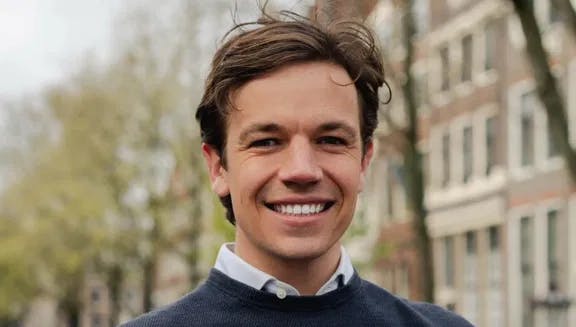#FoundersFridays: Meet Maartje Nelissen and Marcel van der Heijden
How did your career path lead to the founding of Plant FWD?
Maartje: My background is in food service and sustainability. For over ten years, I organised events and provided sustainable catering for large gatherings, such as World Summit AI and The Next Web (TNW), where 15,000 people came together. It struck me that food events often felt quaint compared to these massive tech festivals. I kept meeting the same small group to discuss sustainability, but the food was rarely inspiring. At tech events, on the other hand, I saw an entire sector being propelled forward and positioned as a driver of innovation. I wanted to do the same for the food industry: to take sustainable food out of its niche and showcase more entrepreneurship and ambition.
Marcel: We got to know each other as entrepreneurs. My background is in digital marketing and advertising. I joined the food industry in 2019 when I founded Karma Shoarma and, later on, Karma Kebab. I attended TNW and Web Summit and felt the energy from the content and the dynamic between attendees. Exactly this was missing at food events. The Netherlands has a strong ecosystem for tech and finance but not for food, even though we have a rich history in food production. We wanted to build a platform that connects the food sector, just like ADE does for music and TNW for tech. That's why we deliberately started with an event: it brings people together, creates energy, and puts key topics on the agenda. Our first edition started modestly with 250 participants, while the second edition attracted over 1,000 visitors.
How important is sustainability to Plant FWD, and how do you create impact?
Maartje: Sustainability is at the core of our company. Often, sustainability is seen as a trade-off between commerce and impact, but we believe the two go hand in hand. We show the industry that the protein transition will only succeed if we reach the masses and build attractive, sustainable brands without making it feel like forced veganism. We are one of the most sustainable conferences in the Netherlands. Our venue, Theater Amsterdam, has a Green Key certification. We minimise outsourcing, and our entire catering offering is plant-based, saving 50-60% in CO2 emissions. We are almost waste-free: we avoid printed materials, banners, and flyers, keeping everything as digital as possible. We also try to prevent food waste because food that gets thrown away has a more significant impact than what you consume.
Marcel: Absolutely. The transition to plant-based protein is a driving force behind what we do. We realise that awareness of this transition is still not as strong in many other sectors. Take the energy transition, for example; there is a thousand times more investment than in the protein transition, even though the impact on climate and health is massive. The switch to electric cars involves primarily practical and financial hurdles, while the barrier to changing our food habits seems low at first glance; after all, everyone eats every day. But food is also a topic deeply linked to emotions, politics, and culture. Dutch people find it challenging when you interfere with their eating habits. Behavioural change is one of the hardest things to achieve, and transitions take time.
What's the best career advice you've ever received?
Maartje: "Nail it before you scale it," which means getting everything in order before scaling up. It's easier to make changes when you're still a smaller, agile company than when processes have already become more complex. Set big goals for the future, but allow yourself smaller steps to get there. Having a clear vision for the future energises your team tremendously.
Marcel: "You can't eat an elephant in one go". It's about tackling things step by step. Every year, when we start, it feels like we're staring up at a mountain, but new ideas and challenges emerge. It's essential to break everything down into daily tasks; otherwise, you won't make it.
How would you describe the culture and startup ecosystem in Amsterdam?
Marcel: Amsterdam excels in AI, finance, and smart mobility startups. But when it comes to food startups, it's still a tough market. The food industry is often disregarded compared to tech or energy startups, even though we can't live without clean air and food. The production side of food startups is especially challenging in Amsterdam; companies might have headquarters here, but production often happens elsewhere. A thriving ecosystem needs clusters that include marketing, sales, and a mix of small startups and larger companies.
Maartje: Scaling a food startup is incredibly difficult. Entrepreneurs in the food sector often start with passion, working from their kitchen with an idea that grows bigger than expected. Still, they struggle to turn it into a financially sustainable business. Scaling in food requires significant investment and resources, making profitability harder to achieve. Raising funding is challenging because few comparable companies can serve as benchmarks. Entrepreneurs need more guidance, role models, and peers to help them take the next step. Plant FWD has helped many startups secure funding through matchmaking at our conference.
What was your best business decision?
Marcel: Partnering with Maartje. We wouldn't have gotten this off the ground without each other. We used to send each other memes about hanging in there as entrepreneurs, especially in the early days of our small company. We're parents of young kids, so sometimes we need five minutes to vent before returning to work. That rhythm is essential for us.
Maartje: We learn a lot from each other precisely because of our different backgrounds, and we share the ambition to build a strong brand and push boundaries. I come from the food industry and have worked with many chefs, while Marcel is one of the best strategists and brand builders in the Netherlands. Finding a good business partner and surrounding yourself with great people is crucial. As the saying goes, "It's better to have a great team than a team of greats." When things get tough, and you wonder, 'What did we get ourselves into?' make sure you're working with people who give you energy and with whom you can be honest when you're running on fumes. That's part of the journey. The team you build determines how much you enjoy your work. And enjoyment is essential for the success of your business.
What would you do differently with Plant FWD if you could start over?
Maartje: I would make the event smaller and broaden the focus to include another revenue model. We would launch Plant FWD as a platform where people can become members. We would not immediately try to create the largest event in this sector with 1,200 attendees within two years but start with a more small-scale, less labour-intensive event. A massive event can be overwhelming, with that one big moment you're working towards.
Where do you see Plant FWD in the future?
Marcel: We have several plans. First, we want to create a physical location where the ecosystem of food sustainability and startups can come together. I recently visited Barcelona and Paris for inspiration, and we've already looked at a potential location in Amsterdam. I want this space to become a hub for entrepreneurship, food, and sustainability. Second, we want to develop more programs and campaigns aimed at consumers. Our event currently targets key decision-makers within companies, but we also want to create consumer-facing campaigns, like cooking classes for kids. And third, we don't want to limit our events to Amsterdam; we want to expand to other cities.
Curious about Plant FWD? Check out the Plant FWD programme here.
In addition to the conference, Plant FWD also hosts PlantFWD Week—the world’s first restaurant week dedicated to making menus greener! The second edition takes place this year from 5–12 April, with over 100 restaurants across Amsterdam participating, from street food spots to fine dining establishments.
Visit the website to explore all participating locations! You'll find an interactive city guide to help you navigate the best plant-forward spots in town and discover why they’re worth a visit. Plan your visit via this link.
If you’re an Amsterdam-based founder working on an innovative solution that solves an urban or social challenge, and you’d like to share your story with our audience, email impact@amsterdam.nl
Related articles

#FoundersFridays: Meet Femke Delissen co-founder of PAVA

#FoundersFridays: Meet Marthe de Groot

#FoundersFridays: Meet Sébastien Willems

#FoundersFridays: Meet Marianne Dorder-Servet

#FoundersFridays: Meet Tamim and Rahaf Lymoni

#FoundersFridays: Meet Nick Pfeyffer and Abdullah Alharbi

#FoundersFridays: Meet Shadi Alhakimi

#FoundersFridays: Meet Sebastiaan Zoet

#FoundersFridays: Meet Nikolay Tsanev


